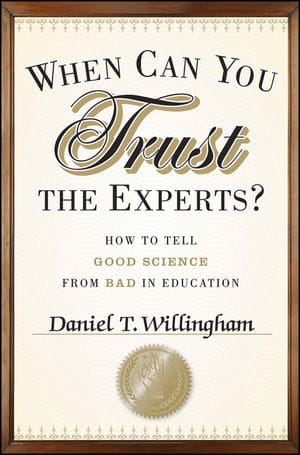 “Research-based,” “brain-based,” “best practices,” “studies show”: Research is used to inform, defend, or rationalize sundry decisions in education policy and practice. But what if the research is no good? This immensely readable book from rock-star cognitive scientist Dan Willingham offers a guide to parsing and filtering sound education research—or research of any sort, for that matter. As examples, he explains the history, statistics, and psychology behind the “learning-styles” and “whole-language” theories. And then debunks both. He flags specific issues in methodology to look for, some more obvious than others, but all necessary for a keen appraisal of edu-research. Finally, he offers four steps to winnowing grain from chaff: First, identify the principal assertion or claim, extracting from it all emotion, framing, and peripheral cues (what Willingham dubs “strip it and flip it”). Second, “trace it.” Who makes the claim—and are they legitimate? Third, “analyze it.” Does the evidence back the claim? And finally ask, “Should I do it?” Does the research offer enough practical persuasion to adopt a new program, policy, or opinion? Playful analogies, humorous pop-culture references, and lucid tables dot the text and help the reader through the abstract. In sum, Willingham provides helpful guidance for those looking to brave the edu-research morass—but he also avers that regular consumers of education should not need to scrutinize scientific journals. Instead, he calls specifically on teacher unions to debunk reforms du jour such as twenty-first century skills and start providing scientifically reliable research analyses so others may focus on implementing valid best practices. (Research-oriented teachers are best suited to tackle this work; the union should be their organizing body, says Willingham.) In the end, Willingham humbly downplays the helpfulness of this book—yet there is no reason for such modesty.
“Research-based,” “brain-based,” “best practices,” “studies show”: Research is used to inform, defend, or rationalize sundry decisions in education policy and practice. But what if the research is no good? This immensely readable book from rock-star cognitive scientist Dan Willingham offers a guide to parsing and filtering sound education research—or research of any sort, for that matter. As examples, he explains the history, statistics, and psychology behind the “learning-styles” and “whole-language” theories. And then debunks both. He flags specific issues in methodology to look for, some more obvious than others, but all necessary for a keen appraisal of edu-research. Finally, he offers four steps to winnowing grain from chaff: First, identify the principal assertion or claim, extracting from it all emotion, framing, and peripheral cues (what Willingham dubs “strip it and flip it”). Second, “trace it.” Who makes the claim—and are they legitimate? Third, “analyze it.” Does the evidence back the claim? And finally ask, “Should I do it?” Does the research offer enough practical persuasion to adopt a new program, policy, or opinion? Playful analogies, humorous pop-culture references, and lucid tables dot the text and help the reader through the abstract. In sum, Willingham provides helpful guidance for those looking to brave the edu-research morass—but he also avers that regular consumers of education should not need to scrutinize scientific journals. Instead, he calls specifically on teacher unions to debunk reforms du jour such as twenty-first century skills and start providing scientifically reliable research analyses so others may focus on implementing valid best practices. (Research-oriented teachers are best suited to tackle this work; the union should be their organizing body, says Willingham.) In the end, Willingham humbly downplays the helpfulness of this book—yet there is no reason for such modesty.
SOURCE: Daniel T. Willingham, When Can you Trust the Experts?: How to Tell Good Science from Bad in Education (San Francisco, CA: Jossey-Bass, 2012).
